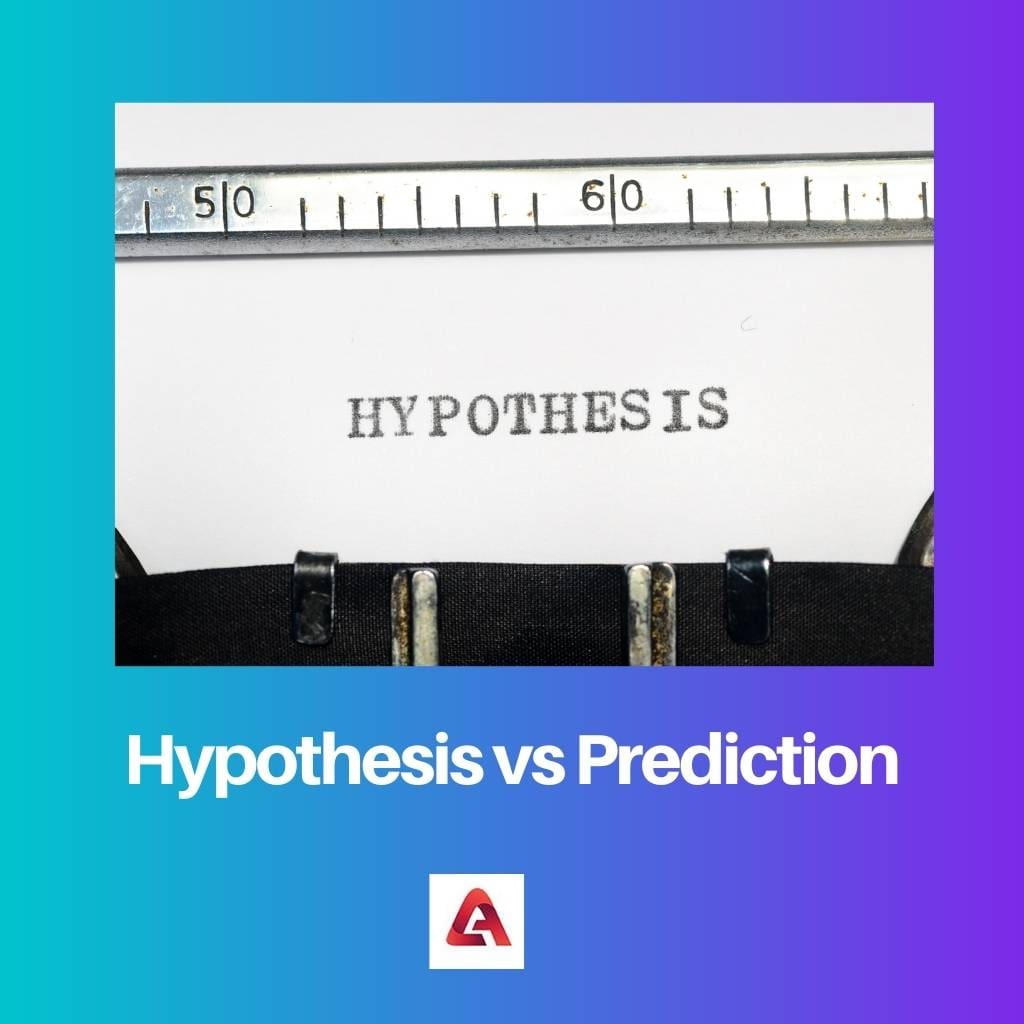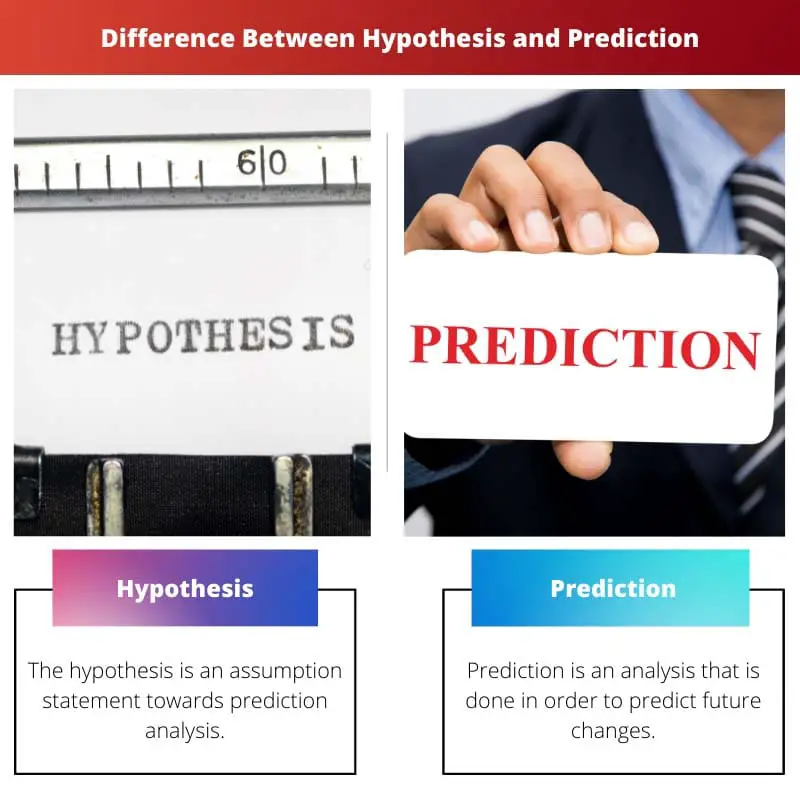Hypothesis and prediction appear to be the same, which is involved in the process of bringing solutions for the future. A Hypothesis is an initial step towards decision-making.
A hypothesis is an assumption statement that is framed in order to arrive at a decision about the population based on the random sample taken from the population.
Key Takeaways
- A hypothesis forms a tentative explanation for a phenomenon, while a prediction anticipates the outcome of an event.
- Hypotheses stem from scientific theories, whereas predictions arise from hypotheses.
- Researchers test hypotheses through experiments while they confirm or refute predictions based on observed results.
Hypothesis vs Prediction
The difference between hypothesis and prediction is that hypothesis is a statement that is assumed about the relationship between the sample and the population. Whereas, prediction is the second stage after descriptive analysis and before prescriptive analysis.

The hypothesis can be classified into various types according to their relationship and assumption criteria. They are the Null Hypothesis and Alternative Hypothesis, which are based on the nature of the assumption.
The other two types which are based on the relationship between the sample and the population, are the Simple hypothesis and Composite Hypothesis.
Prediction is the second step in the process of analysis, which is focused on forecasting. It is used in Time Series and Forecasting to predict future changes and development.
There are various methods and models involved in the process of prediction, such ARIMA model, SARIMA model, and so on.
Comparison Table
| Parameters of Comparison | Hypothesis | Prediction |
|---|---|---|
| Definition | The hypothesis is an assumption statement towards prediction analysis. | Prediction is an analysis that is done in order to predict future changes. |
| Types | The null hypothesis, alternative hypothesis, simple null, and simple alternative hypothesis, composite null, and composite alternative hypothesis. | Inductive prediction, Deductive predictive, and Abductive prediction. |
| Mechanism | A hypothesis starts the analysis. | Prediction is the final step in the analysis. |
| Use | A hypothesis is used in Testing of Hypothesis, which is a branch in Statistical Inference | Prediction is used in prediction analysis in Time Series and Forecasting. |
| Example | Null Hypothesis – There is no significant difference between the sample statistic and the population parameter. Alternative Hypothesis- There is a significant difference between the sample statistic and the population parameter. | Prediction analysis for a startup : There is an increase in the sales and profit in the due course of 3 years, which on further prediction analysis would lead to development in the revenue. |
What is Hypothesis?
A hypothesis is an initial process testing whether there is any relationship between the population and the sample taken from the population. This analysis of the relationship would help in determining and framing decisions towards the population.
Framing an assumption, testing it using statistics, and deriving a conclusion is called Hypothesis Testing.
Null Hypothesis and Alternative Hypothesis are framed as an initial step, which forms the basis of testing. Simple and composite hypotheses are the building blocks of hypothesis testing.
There are various theorems that are determined based on the hypothesis that we are choosing.
There are various steps involved in the hypothesis testing process. The first step would be framing the hypothesis, which is the null hypothesis and alternative hypothesis.
Then proceeding further with the level of significance, Statistic formulation, and comparing it with the level of significance to either accept or reject the null or alternative hypothesis.
The hypothesis statement framing is a very important process in the theory of statistics. Statistics has two main branches, one is the Estimation theory, and the other is the Testing of Hypothesis.
These two branches are regarded to be the backbone of Statistics.

What is Prediction?
Prediction is the process of using data and statistical techniques to bring out useful insights about the future. There are various tools and techniques employed in the process of predictive analysis.
Predictive analysis forms the basis of Forecasting. Forecasting helps in developing the business process.
Prediction helps in answering questions related to future development. What will the development scale of the company be in the period of 5 years hence?
Such questions will be answered using the prediction process. It is regarded as the most important technique in the production and improvement process.
Prediction involves analyzing past data, using various tools and techniques in statistics such as the method of least squares, likelihood function, distribution function, and so on, and then building various optimizing and stimulation models for forecasting.
It is a kind of analysis that is the process of predicting the future.
Predictions help in detecting flaws in any system, optimizing and minimizing risks, improving operations, and reducing future risks. It is helpful in developing and improving the techniques for future analyses.

Main Differences Between Hypothesis and Prediction
- A hypothesis is an explanation about a population based on the sample taken from the population, whereas prediction is the technique of predicting what will happen in the future.
- Hypothesis employs variables and parameters in its process of analysis, whereas prediction employs past data in its process of prediction analysis.
- The hypothesis is involved in the testing of hypothesis theory, while Prediction is involved in forecasting theory and time series analysis.
- The hypothesis involves dependent and independent variables in the statistical theory, and prediction analysis involves various theorems and techniques which predict a series of data for the required period.
- An example statement describing the hypothesis is, ” There is an increase in the number of defects in the products manufactured.’ The example statement describing Prediction is, “As there is an increase in the number of defects in the manufactured products, we need to analyze the manufacturing methodology”.

- https://www.journals.uchicago.edu/doi/pdf/10.1093/bjps/VIII.32.281
- https://science.sciencemag.org/content/307/5707/219.abstract

The article provides a comprehensive overview of hypothesis and prediction, effectively outlining their distinct roles in statistical analysis.
I particularly found the detailed comparison table between hypothesis and prediction to be very informative, aiding in their clear understanding.
The article effectively explains the role of hypotheses in statistical inference and the crucial process of prediction in forecasting future developments.
I appreciate the detailed comparison between hypothesis and prediction, shedding light on their different applications in statistical analysis.
Absolutely, it’s insightful to understand how each concept contributes to the decision-making process.
The article effectively distinguishes between hypothesis and prediction, offering clarity on their roles in the statistical analysis process.
I particularly found the comparison table detailing the parameters of hypothesis and prediction to be very informative and clear.
Agreed. The article provides a comprehensive understanding of the different types of hypotheses and the step-by-step process of hypothesis testing.
This article effectively outlines the importance of hypotheses in statistical analysis and the process of prediction in forecasting future developments.
The detailed explanation of each concept provides valuable insights into their roles in the field of statistical analysis.
The article provides a clear and detailed comparison between hypothesis and prediction, providing a comprehensive understanding of their applications in statistical analysis.
Absolutely, understanding the differences between these concepts is crucial for making data-driven decisions and forecasting future developments accurately.
The comprehensive explanation of both hypothesis and prediction in the article provides valuable insights into their significance in the decision-making process.
Absolutely, the article effectively details the different types of hypotheses and the predictive analysis methods, aiding in a better understanding of their roles.
Agreed. The article presents a clear comparison between hypothesis and prediction, highlighting their respective contributions to statistical analysis.
The article does a great job of explaining the crucial differences between hypothesis and prediction, and how they both function in the decision-making process.
Absolutely, these concepts play a vital role in statistical inference and forecasting.
I agree, it’s essential to understand the distinction between a hypothesis and a prediction in order to make informed decisions based on data.
The article provides comprehensive information, covering various types of hypotheses and the methods involved in predictive analysis.
Indeed, the article effectively highlights the significance of hypotheses and predictions in statistical analysis.
The article effectively explains the conceptual differences between hypothesis and prediction, providing valuable insights into their roles in decision-making and forecasting.
Absolutely, the detailed explanation of the concepts aids in better understanding their applications and significance in statistical analysis.
The article does an excellent job of explaining the vital role of hypotheses and predictions in statistical decision-making and forecasting future developments.
Absolutely, understanding these concepts is essential for accurate data-driven decision-making and forecasting.